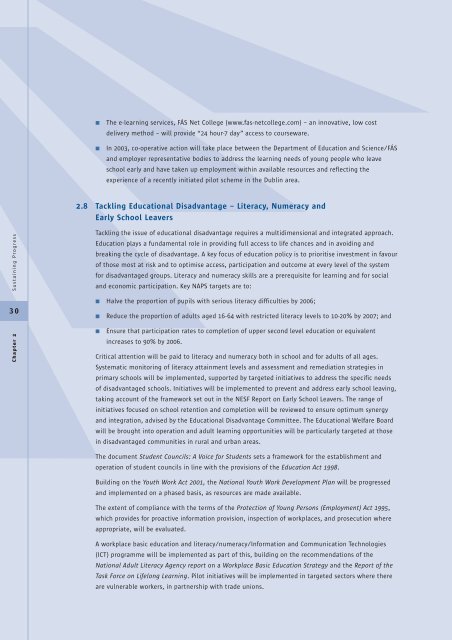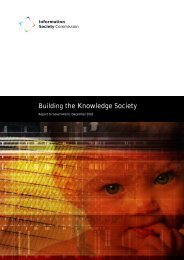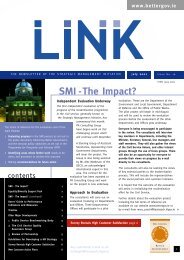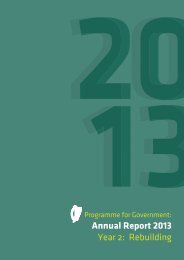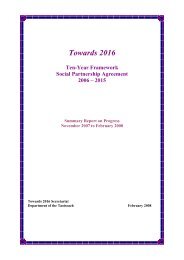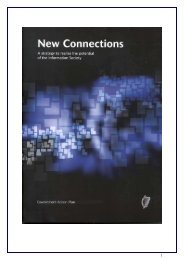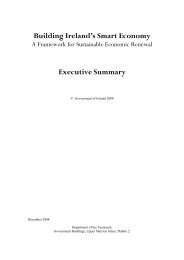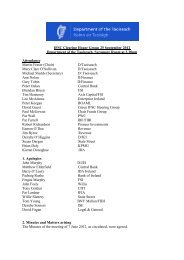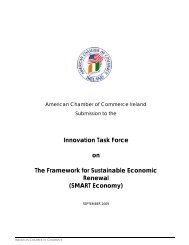Sustaining Progress - Department of Taoiseach
Sustaining Progress - Department of Taoiseach
Sustaining Progress - Department of Taoiseach
Create successful ePaper yourself
Turn your PDF publications into a flip-book with our unique Google optimized e-Paper software.
Chapter 2 <strong>Sustaining</strong> <strong>Progress</strong><br />
30<br />
■ The e-learning services, FÁS Net College (www.fas-netcollege.com) – an innovative, low cost<br />
delivery method – will provide “24 hour-7 day” access to courseware.<br />
■ In 2003, co-operative action will take place between the <strong>Department</strong> <strong>of</strong> Education and Science/FÁS<br />
and employer representative bodies to address the learning needs <strong>of</strong> young people who leave<br />
school early and have taken up employment within available resources and reflecting the<br />
experience <strong>of</strong> a recently initiated pilot scheme in the Dublin area.<br />
2.8 Tackling Educational Disadvantage – Literacy, Numeracy and<br />
Early School Leavers<br />
Tackling the issue <strong>of</strong> educational disadvantage requires a multidimensional and integrated approach.<br />
Education plays a fundamental role in providing full access to life chances and in avoiding and<br />
breaking the cycle <strong>of</strong> disadvantage. A key focus <strong>of</strong> education policy is to prioritise investment in favour<br />
<strong>of</strong> those most at risk and to optimise access, participation and outcome at every level <strong>of</strong> the system<br />
for disadvantaged groups. Literacy and numeracy skills are a prerequisite for learning and for social<br />
and economic participation. Key NAPS targets are to:<br />
■ Halve the proportion <strong>of</strong> pupils with serious literacy difficulties by 2006;<br />
■ Reduce the proportion <strong>of</strong> adults aged 16-64 with restricted literacy levels to 10-20% by 2007; and<br />
■ Ensure that participation rates to completion <strong>of</strong> upper second level education or equivalent<br />
increases to 90% by 2006.<br />
Critical attention will be paid to literacy and numeracy both in school and for adults <strong>of</strong> all ages.<br />
Systematic monitoring <strong>of</strong> literacy attainment levels and assessment and remediation strategies in<br />
primary schools will be implemented, supported by targeted initiatives to address the specific needs<br />
<strong>of</strong> disadvantaged schools. Initiatives will be implemented to prevent and address early school leaving,<br />
taking account <strong>of</strong> the framework set out in the NESF Report on Early School Leavers. The range <strong>of</strong><br />
initiatives focused on school retention and completion will be reviewed to ensure optimum synergy<br />
and integration, advised by the Educational Disadvantage Committee. The Educational Welfare Board<br />
will be brought into operation and adult learning opportunities will be particularly targeted at those<br />
in disadvantaged communities in rural and urban areas.<br />
The document Student Councils: A Voice for Students sets a framework for the establishment and<br />
operation <strong>of</strong> student councils in line with the provisions <strong>of</strong> the Education Act 1998.<br />
Building on the Youth Work Act 2001, the National Youth Work Development Plan will be progressed<br />
and implemented on a phased basis, as resources are made available.<br />
The extent <strong>of</strong> compliance with the terms <strong>of</strong> the Protection <strong>of</strong> Young Persons (Employment) Act 1995,<br />
which provides for proactive information provision, inspection <strong>of</strong> workplaces, and prosecution where<br />
appropriate, will be evaluated.<br />
A workplace basic education and literacy/numeracy/Information and Communication Technologies<br />
(ICT) programme will be implemented as part <strong>of</strong> this, building on the recommendations <strong>of</strong> the<br />
National Adult Literacy Agency report on a Workplace Basic Education Strategy and the Report <strong>of</strong> the<br />
Task Force on Lifelong Learning. Pilot initiatives will be implemented in targeted sectors where there<br />
are vulnerable workers, in partnership with trade unions.


